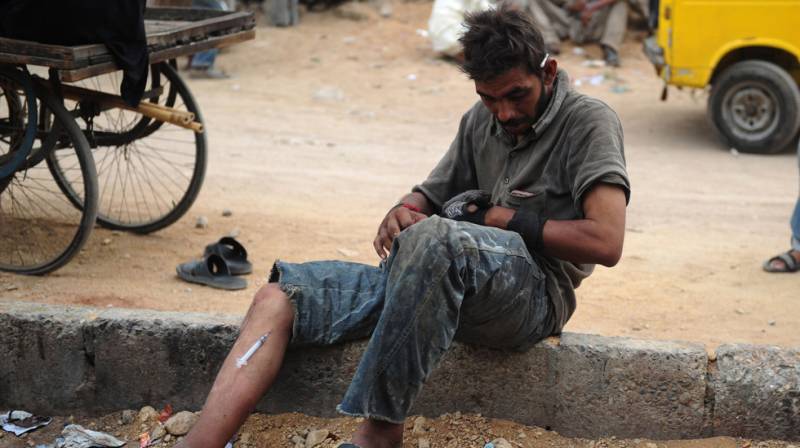
“All sins tend to be addictive, and the terminal point of addiction is damnation” - W.H. Auden
The problem with society is that while it does comprise of human beings as members, it evolves as a system that tends to vociferously defend its norms in a drive against those very individuals. Thus, without taking into consideration any peculiarities surrounding one or more human beings, it is quick to subject them to condemnation. As long as things move smoothly in accordance with the demands of a particular society, all seems well, but the moment there is the slightest form of deviance, everything goes haywire forcing controllers to either seek solutions or adopt the easier way of stigmatizing the source of trouble to either warn or punish the ‘culprits.’
The abuse of drugs is one such issue that society looks upon with tremendous concern, and rightfully so. Addiction to narcotics is undoubtedly not only mentally and physically unhealthy for the addict but also creates many complications for the society, tearing apart families causing extreme difficulties in otherwise normal relationships. Addicts tend to become isolated, losing friends and families as their behavior, either hostile or passive, gradually becomes more and more intolerable for others.
Adventurism is part of human nature. Just to kick off the adrenaline rush people tend to indulge in acts that may appear scary and dangerous too. Mountain climbers, race drivers, thrill seekers, experimentalists, etc. are examples of some who are courageous enough to undertake mission impossible in a bid to prove themselves. However, when it comes to adventure in the nature of playing with functions of the mind, then matters can get out of hand.
We need to understand that the human brain is the central processing unit with its own peculiar set-up and chemical composition that is naturally tuned to controlling our overall body mechanisms, as well as our train of thought. Any tinkering with this system can cause malfunctioning or even a total shut-down as happens when a virus attacks the computer’s CPU. Similarly, psychoactive substances capture the central nervous system altering functions of the brain that cause temporary changes in one’s perception, mood, consciousness and behavior. In other words, they disrupt the normal pattern of a person’s physical make-up. These drugs are prescribed by specialists and administered under strict supervision for certain medical conditions. Taking them otherwise, amounts to abuse of these substances.
Some people abuse drugs because of peer pressure or merely for excitement. They are just pleasure seekers involved in bad habits. For those with weaker nerves whose life is full of stress and tensions because of multiple reasons, it is very easy to get carried away by any incitement towards using these substances. This is their way to momentarily shut their eyes against their painful situation without realizing that when they gain consciousness, the pain would still be there and rather than dealing with it they go on escaping into the wilderness of their imagination. Unfortunately, this escape route is addictive and extremely harmful mostly resulting in poor health, social alienation, unemployment and can have serious financial repercussions. The withdrawal symptoms of many of these drugs are very pernicious causing the addict to go to any extent in order to get another dose.
Wendell Berry, in one of his Agrarian Essays beautifully sums up the cause and effects of drug abuse: “People use drugs, legal and illegal, because their lives are intolerably painful or dull. They hate their work and find no rest in their leisure. They are estranged from their families and their neighbors. It should tell us something that in healthy societies drug use is celebrative, convivial and occasional, whereas among us it is lonely, shameful and addictive. We need drugs, apparently, because we have lost each other.”
At present, the attitude of the society is quite harsh towards drug dependents. No doubt, addicts in the family can be very menacing but one cannot write off one’s kin just because they maybe extra sensitive. Rehabilitation is one way out of this problem and more important than that is an attentive ear that is willing to absorb their balderdash and a soft heart which feels for the agony they are going through.
For those dealing with addicts there are some important things they must keep in mind. One, addiction cannot be overcome by sheer will power. Drugs can alter the brain chemistry to render the strongest person helpless. Two, these changes can be reversed because addiction is a disease which can be treated. Three, addiction can be cured at any stage. Hitting rock bottom before any treatment can commence is just a myth. Four, cajoling by family members, friends and employers can convince addicts to change their habits for, the moment they become aware of it, they are eager to seek help. Five, getting addicts back on the track is a long drawn process that demands patience. Occasional bouts of relapses should not be discouraging but be taken as a sign of changing the method of treatment.
This year, the United Nations Office on Drugs and Crime (UNODC) has penned the theme “People first: Stop stigma and discrimination, strengthen prevention” for the International Day Against Drug Abuse. The idea is to place human beings before anything else. In other words, instead of discriminating addicts, they should be dealt with empathy and kindness because they are already suffering on account of their ill habit therefore they must not be subjected to further humiliation. Rather, efforts should be made to prevent addiction where possible and render treatment to those who are already trapped in this malaise. So the catchword this year is ‘compassion’ which says volumes when in relation to mankind.

